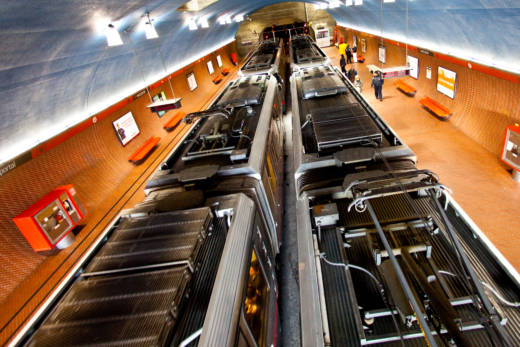Muni began advising riders two days after the tunnel reopened on Aug. 25 that some trains were being delayed by “signal issues” at West Portal — the western entrance to the 2-mile bore.
Based on a review of Muni advisories on Twitter, those issues eased after a few days. But daily delays described as “system issues” or “signal issues” began again on Monday, causing major backups in K, L and M service heading toward downtown San Francisco.
John Haley, the SFMTA’s director of transit, said Wednesday the problems were due to missteps by Shimmick.
Haley said in an interview that both series of problems involved Muni Metro’s automatic train control system.
When Muni’s light-rail vehicles enter the system’s tunnels, including the Twin Peaks Tunnel, they transition from operator control to the automatic system. The train control system includes trackside equipment that identifies each vehicle as it arrives by counting the number of axles.
If that identification is made as intended — Haley said the process involves a “handshake” between computerized equipment at trackside and aboard each light-rail vehicle — the train is put on automatic control. In the case of the refurbished Twin Peaks Tunnel, the train is cleared to travel to the next station, Forest Hill, at a speed of 50 mph.
Haley said that immediately after the tunnel reopened last month, the automatic train control system was not executing the “handshake” at West Portal. The system’s response is to slow the trains to a crawl.
Haley said that the problem, which he described as intermittent but disruptive, involved improperly reinstalled components for the train control system.
“That could mean the components were relocated in the wrong place, they were buried under track or ballast that was put back down, that kind of thing,” Haley said.
He added that SFMTA employees have found that by reducing the automatically set speeds for a 1,000-foot section of eastbound track at West Portal, trains are able to proceed through the area without stopping. Once past the affected section of track, trains are able to resume their normal speed.
Haley said the second issue was more serious and grew out of previously scheduled construction last Friday night.
Shimmick crews brought heavy equipment into the tunnel through the West Portal entrance, he said, and in the process damaged the train control system’s trackside components.
“They had all sorts of heavy equipment vehicles going in, and they damaged the equipment alongside the trackway,” Haley said.
One of the components damaged was the system that counts vehicle axles. Haley said the result is that the system “stops the train and says, ‘Wait a minute, you’re not going any further until we figure out who you are.’ ”
The damage was extensive enough that it has prevented Muni from issuing remote commands to clear the problem from its operations control center. Instead, two Muni workers have been stationed at West Portal, Haley said, and are trying to manually correct problems with the system.
Haley added that the damage has caused a ripple effect throughout the Muni Metro system, as it forces downtown-bound trains to slow to 25 mph for the entire length of the Twin Peaks Tunnel.
He said Muni crews have replaced much of the damaged equipment at trackside and are working with the train control system’s manufacturer on a fix that could be in place later Wednesday.
Haley said the SFMTA has discussed the problems with Shimmick Construction, but declined to characterize the conversations.
But a representative for Shimmick said the company is not to blame for the train control problems and denied its equipment caused any damage last weekend.
“We have reached out to the San Francisco Municipal Transportation Agency to offer our continued post-construction support,” Chapin Fay, a Shimmick spokesperson, said in an emailed statement. “The automatic train control system work on the project was not under our purview and we are not aware of any damage that was done this weekend by our equipment.”
The Supervisor that represents the area of the West Portal station expressed outrage on Thursday after learning about the subway problems.
“These delays are unacceptable,” said Supervisor Norman Yee in an emailed statement.
“I urge the SFMTA to work with the contractors to resolve these issues as soon as possible.”
The new West Portal problems come just weeks after Mayor London Breed put SFMTA chief Ed Reiskin on notice she expects quick action to resolve the transit agency’s service issues.
Asked how much the West Portal issues might cost, Haley said, “Well, I can tell you the biggest concern I have for the cost is the public inconvenience and the impact on service. … I’m less concerned about the dollar value than the loss of confidence that our riders have.”

